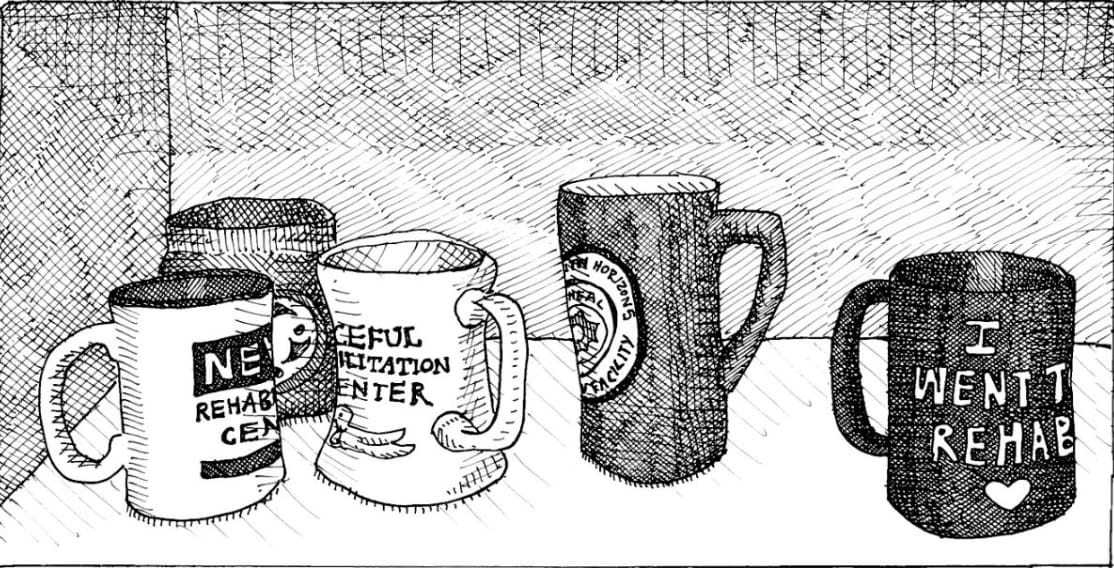
Rehab can be a great experience. People can learn much about themselves, their current state of affairs and what to do about it now. The trouble starts when the repetition does. If you’ve been to rehab once, there’s no reason for you to go again. It’s supposed to work the first time around. Yet, people get bullied into thinking a new exotic locale with more personalized care and, oh, more sunshine and horse petting or something else will lock in a sufficient reprogramming. What do multiple visits usually get a patient in terms of net results? Just a collection of rehab mugs.
Additionally, rehab isn’t available to all who need it; in fact, it’s affordable to a very small percentage. (As a side note, a simple tax raise on alcohol could provide state-of-the-art treatment for all in need, but that’s a pipe dream.)
Until then, here are some alternatives.
Individual therapy: For those who can afford it, individual therapy may be the way to go. Usually, the transformative change credited to “rehab” results from a workable patient-therapist relationship developed at the center. Groups can be effective and helpful, but also devolve into venomous gossip pits. Plus, it’s usually a great place to find your next running partner if you’re itching to go out. (And someone always, always goes out.) Remember about 5 years ago, “individualized care” became the sun-dried tomato of the rehab sphere. Is there a way to get individualized care? There is: Stay out of groups and high school structures.
Medication assistance. It cuts the rate of death by 70%, that’s far too much to be ignored. Nobody finds any range of recovery if they are dead. Medication in many forms can help manage many of the reasons people became substance abusers in the first place: Anxiety, depression, chronic pain, and many other conditions can all be managed. Antabuse, Vivitrol, antidepressants. Sometimes drinking is actually the only problem. Those people stop drinking and, presto, they’re perfect. More/most people have co-existing mental health issues that are sometimes accelerated with abstinence. That’s always fun! But look: Sometimes your defect is more than spiritual, it’s mental, and you need to be on meds to help you feel less insane while you get sober.
Mutual Aid Groups: Millions have found aid and comfort in AA, Smart Recovery, Refuge Recovery, Celebrate Recovery (SUPER SUPER CHRISTIAN SO WATCH OUT!), and other mutual aid organizations. It may be one of the truly egalitarian systems in America.
Vigorous, heart-pumping exercise. It shows similar results to antidepressants. 160 BPM sustained for 20-30 minutes usually gets rid of the urge to shoot up. It helps the hamster wheel of obsessive thoughts that plague many with substance misuse issues. As a bonus, it’s free, or it can be. Gyms, yoga, and spin classes are all options. It’s very difficult for depression to hit a moving target. Move. Breathe. Breathe like an athlete, four counts in through the nose, four out from the mouth.
Harm Reduction. Harm reduction IS recovery to some people. I define recovery as ANY positive change. Using sterile needles to inject is better than using needles found in the gas station bathroom. The truth that people who make their living pontificating abstinence don’t want you to know is that cannabis manages risk by 99%. People who successfully switch from alcohol to cannabis have vastly improved lives. They aren’t risking vital organ function, and there is no risk of lethal ingestion. Alcohol kills 88k Americans a year, cannabis kills zero. Cannabis can mitigate or eliminate other drug use. Many people are extinguishing their use of high-risk pharmaceuticals with low-risk cannabis. Is it without risk? No. Does it manage risk? Without question. Fully formed adults in a controlled environment are perfectly safe using it.
Accept you’re a drug user. Any drug use is not a pathology or a crime. There are plenty of people who don’t need criteria. Not everyone has to be “fixed.” There is a whole subculture of Rehab Kids floating around Del Ray Beach, Florida, who’ve been abandoned by their families and handed over to the Rehab Industry. They go to treatment, clean up, relapse, and pop up at some other 30-60-90 at another bucolic setting, this time in the Northeast. Here’s a good composite of who I’m talking about: male, white, under 30. At some point, it’s just about honesty, so let me suggest that they call their parents and tell them they’d rather use drugs. Rehab becomes their identity and badge of honor. “I’ve been to 14 rehabs!” shouldn’t be a point of pride. America is one of the largest consumers of drugs the world has ever known, so why hate drug users? Is being a drug user really the worst thing a person can be?*****Joe Schrank, MSW, is a social worker, writer, and emotional well-being coach for Georgia State Baseball. He founded The Fix and High Sobriety, and still believes the Ramones explain recovery better than most rehab brochures ever will.
